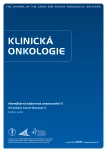DICER1 Syndrome
Authors:
Věra Hořínová 1,2; Klára Drábová 3,4; Hana Nosková 5; Viera Bajčiová 4; Jana Šoukalová 3; Leona Černá 6; Věra Hůrková 7; Ondřej Slabý 8; Jaroslav Štěrba 4
Authors‘ workplace:
Ambulance lékařské genetiky, Nemocnice Jihlava
1; Reprofit, Brno
2; Oddělení lékařské genetiky, FN Brno
3; Klinika dětské onkologie, FN Brno
4; CEITEC – Středoevropský technologický institut, Masarykova univerzita a FN Brno
5; Gennet, Praha
6; PREDIKO, Zlín
7; Klinika komplexní onkologické péče, Masarykův onkologický ústav, Brno
8
Published in:
Klin Onkol 2019; 32(Supplementum2): 123-127
Category:
Case Report
doi:
https://doi.org/10.14735/amko2019S123
Overview
DICER1 syndrome is an inherited disorder that increases the risk of different types of malignant and benign tumors. The syndrome is caused by mutations in the DICER1 gene, which is located on the long arm of chromosome 14, region q32.13. Patients with DICER1 syndrome commonly develop pleuropulmonary blastoma (PPB), multinodular goiter, ovarian Sertoli–Leydig cell tumors, and/or other types of tumors. In approximately 35% of families with children manifesting PPB, further (and rather rare) malignancies may be observed, including cystic nephroma, nodular dysplasia of the thyroid gland, medulloepithelioma of the iris, embryonal rhabdomyosarcoma botryoid type, nasal epithelial hamartoma, pituitary blastoma, and/or pineoblastoma. Large studies report a high variability of tumors associated with DICER1. DICER1 syndrome, which is associated with an inherited predisposition to tumors, is inherited in an autosomal dominant pattern. Symptoms of DICER1 syndrome may vary, even within families. Preventive screening of carriers with causative mutations is complicated. Follow-up is undertaken as recommended by the 2016 International PPB Register.
This work was supported by grant of Ministry of Health of the Czech Republic AZV 16-3329A.
The authors declare they have no potential conflicts of interest concerning drugs, products, or services used in the study.
The Editorial Board declares that the manuscript met the ICMJE recommendation for biomedical papers.
Submitted: 4. 6. 2019
Accepted: 6. 6. 2019
Keywords:
genetic testing – hereditary cancer syndromes – DICER1 – pleuropulmonary blastoma – cystic nephroma
Sources
1. Slade I, Bacchelli CH, Davies H et al. DICER1 syndrome: clarifying the diagnosis, clinical futures and management implications of a pleiotropic tumor predisposition syndrome. J Med Genet 2011; 48 (4): 273–278. doi: 10.1136/jmg.2010.083790.
2. Schultz KA, Williams GM, Kamihara J et al. DICER1 and associated conditions: identification of at-risk individuals and recommended surveillance strategies. Clin Cancer Res 2018; 24 (10): 2251–2261. doi: 10.1158/1078-0432.CCR-17-3089.
3. Kim J, Field A, Schultz KA et al. The prevalence of DICER1 pathogenic variation in population databases. Int J Cancer 2017; 141 (10): 2030–2036. doi: 10.1002/ijc.30907.
4. Stewart DR, Best AF, Williams GM et al. Neoplasm risk among individuals with a pathogenic germline variant in DICER1. J Clin Oncol 2019; 37 (8): 668–676. doi: 10.1200/JCO.2018.78.4678.
5. Hill DA, Dehner LP. A cautionary note about congenital cystic adenomatoid malformation (CCAM) type 4. Am J Surg Pathol 2004; 28 (4): 554–555.
6. Hill DA, Ivanovich J, Priest JR et al. Germline DICER1 mutations in familial pleuropulmonary blastoma. Science 2009; 325 (5943): 965. doi: 10.1126/science.1174334.
7. Priest JR, Watterson J, Strong L. Pleuropulmonary blastoma: a marker for familial disease. J Pediatr 1996; 128 (2): 220–224.
8. Doros L, Schultz KA, Stewart DR et al. DICER1-related disorders: genereviews. [online]. Available from: http: //www.ncbi.nlm.nih.gov/books/NBK196157/.
9. Schultz KA, Rednam SP, Kamihara J et al. PTEN, DICER1, FH, and their associated tumor susceptibility syndromes: clinical features, genetics, and surveillance recommendations in childhood. Clin Cancer Res 2017; 23 (12) : e76–e82. doi: 10.1158/ 1078-0432.CCR-17-0629.
10. The International Pleuropulmonary Blastoma/DICER1 Registry. [online]. Available from: www.PPBregistry.org.
11. European Cooperative Study Group for Pediatric Rare Tumors. [online]. Available from: www.raretumors-children.eu.
Labels
Paediatric clinical oncology Surgery Clinical oncologyArticle was published in
Clinical Oncology

2019 Issue Supplementum2
- Possibilities of Using Metamizole in the Treatment of Acute Primary Headaches
- Metamizole vs. Tramadol in Postoperative Analgesia
- Spasmolytic Effect of Metamizole
- Metamizole at a Glance and in Practice – Effective Non-Opioid Analgesic for All Ages
- Safety and Tolerance of Metamizole in Postoperative Analgesia in Children
-
All articles in this issue
- Recommendations for Preventive Care for Women with Rare Genetic Cause of Breast and Ovarian Cancer
- Risks of Solid Tumors in Heterozygous Carriers of Recessive Syndromes
- Karcinom prsu u nosiček mutací v genu BRCA1/2 – léčíme ho jinak? Zaměřeno na systémovou terapii u mutací v genu BRCA1/2
- Effectiveness of Neoadjuvant Therapy with Platinum-Based Agents for Patients with BRCA1 and BRCA2 Germline Mutations – A Retrospective Analysis of Breast Cancer Patients Treated at MMCI Brno
- Germline CHEK2 Gene Mutations in Hereditary Breast Cancer Predisposition – Mutation Types and their Biological and Clinical Relevance
- Contribution of Massive Parallel Sequencing to Diagnosis of Hereditary Ovarian Cancer in the Czech Republic
- Genetic Causes of Rare Pediatric Ovarian Tumors
- Gastrointestinal Polyposes and Lynch Syndrome – a Pathologist’s Perspective
- An Update on Inherited Colon Cancer and Gastrointestinal Polyposis
- BAP1 Syndrome – Predisposition to Malignant Mesothelioma, Skin and Uveal Melanoma, Renal and Other Cancers
- DICER1 Syndrome
- GAPPS – Gastric Adenocarcinoma and Proximal Polyposis of the Stomach Syndrome in 8 Families Tested at Masaryk Memorial Cancer Institute – Prevention and Prophylactic Gastrectomies
- Twenty Years of BRCA1 and BRCA2 Molecular Analysis at MMCI – Current Developments for the Classification of Variants
- Clinical Oncology
- Journal archive
- Current issue
- About the journal
Most read in this issue
- Germline CHEK2 Gene Mutations in Hereditary Breast Cancer Predisposition – Mutation Types and their Biological and Clinical Relevance
- Risks of Solid Tumors in Heterozygous Carriers of Recessive Syndromes
- Recommendations for Preventive Care for Women with Rare Genetic Cause of Breast and Ovarian Cancer
- GAPPS – Gastric Adenocarcinoma and Proximal Polyposis of the Stomach Syndrome in 8 Families Tested at Masaryk Memorial Cancer Institute – Prevention and Prophylactic Gastrectomies
